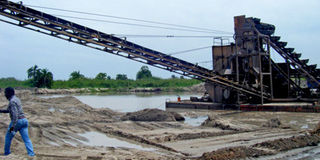Prime
Authorities put illegal sand miners on notice

Mining. One of the sand mining sites in Lwera swamp. In an effort to save swamps, district authorities have instituted tough measures to regulate sand mining business in the area. PHOTO BY SHAMIM J NAKAWOOYA
What you need to know:
- In May this year, government put sand, stones and murram under the category of minerals in the new approved mining policy. Government believes this will end unregulated sand mining across the country.
- Ms Rose Nakyejwe, the Masaka District environment officer, said if the current rate of sand mining is not checked, shallow wells, boreholes and other water sources in the district are at risk of drying up because of the falling water table in places where sand mining takes place.
Masaka. In a bid to save the disappearing wetlands in Masaka District, the area authorities have instituted tough measures to regulate sand mining business.
According to Mr Achilles Mawanda, the Masaka District speaker, they have resolved that all companies and individual sand miners first get Environmental Impact Assessment reports from National Environment Management Authority (Nema) before they are allowed to operate in the district.
“We found it imperative to streamline sand mining business in the district considering the rate at which wetlands are being invaded for sand mining activities,” he said during an interview on Tuesday.
Sand mining has in the past decade become a profitable business due to the growing construction sector.
Recently, environmentalists raised concern over the increasing sand mining in major swamps such as Lwera on the Kampala–Masaka highway, saying excessive excavation of sand will spark off a serious ecological disaster.
The Masaka District chairperson, Mr Jude Mbabaali, said all sand miners will be registered before issuing them with licences to keep away those that are involved in illegal sand mining.
“They [sand miners] will have to apply declaring their intention to carry out the activity and will also be required to contribute some revenue to the district,” he said.
However, Mr Mbabaali did not reveal how much each sand miner will pay to the district to secure a licence.
He said the new guidelines will also apply to those engaging in mining clay and murram .
Like many districts, Masaka lacks gazetted places for sand mining and the existing ones are both in gazetted wetlands and on private mailo land.
The district boss said a big number of sand miners in the district are currently mining sand in a very destructive way because there have been no regulations, leaving huge open pits and trenches behind after excavating sand in wetlands which are dangerous to the environment.
A couple of years ago, the Ministry of Water and Environment announced that they were in the process of demarcating areas around the country in which sand mining will be permitted. The move is aimed at ensuring greater protection of the natural ecosystem.
Mr Florence Namayanja, the Bukoto East Member of Parliament and also shadow minister for Environment, welcomed the decision to regulate sand mining in Masaka, saying the plan was long overdue.
“It has always been my wish to see our local leaders adopt a cautious approach in protecting endangered natural resources .I pray that they expand their scope and include forests and traditional water sources,” he said.
Mr John Mukasa, a sand miner at Kyabakuza Village in Kimaanya/Kyabakuza Division, Masaka Municipality claimed that the regulations are targeting small scale miners that use rudimentary tools such as hand hoes and spades.
“It is unfortunate that companies and individuals that use sophisticated technology such as tractors and excavators, which are more destructive to the environment are always considered when it comes to implementation of such laws,” he said.
Ms Rose Nakyejwe, the Masaka District environment officer, said if the current rate of sand mining is not checked, shallow wells, boreholes and other water sources in the district are at risk of drying up because of the falling water table in places where sand mining takes place.
“The pits where sand is excavated if not restored will cause ground water table to drop, leaving water wells in these areas dry,” she said.
Government policy on sand mining
In May this year, government put sand, stones and murram under the category of minerals in the new approved mining policy. Government believes this will end unregulated sand mining across the country.
Under the new policy, any one intending to venture into sand mining will be required to acquire a license from the Ministry of Energy and Mineral Resources. According to the new policy, whoever will be caught engaging in sand mining without a license will be fined Shs500, 0000 or jailed for one year or both.
Last year, local leaders in the neigbouring Kalungu and Mpigi districts said they lacked the political clout to stop the illegal sanding mining in Lwera wetland despite Parliament halting the activities.
Kalungu District chairperson, Richard Kyabaggu said the issue surrounding sand mining in Lwera, a spacious wetland along Kampala–Masaka highway,was bigger for them as a district and all their efforts to stop the illegal activities have in the past failed due to ‘external factors’.



